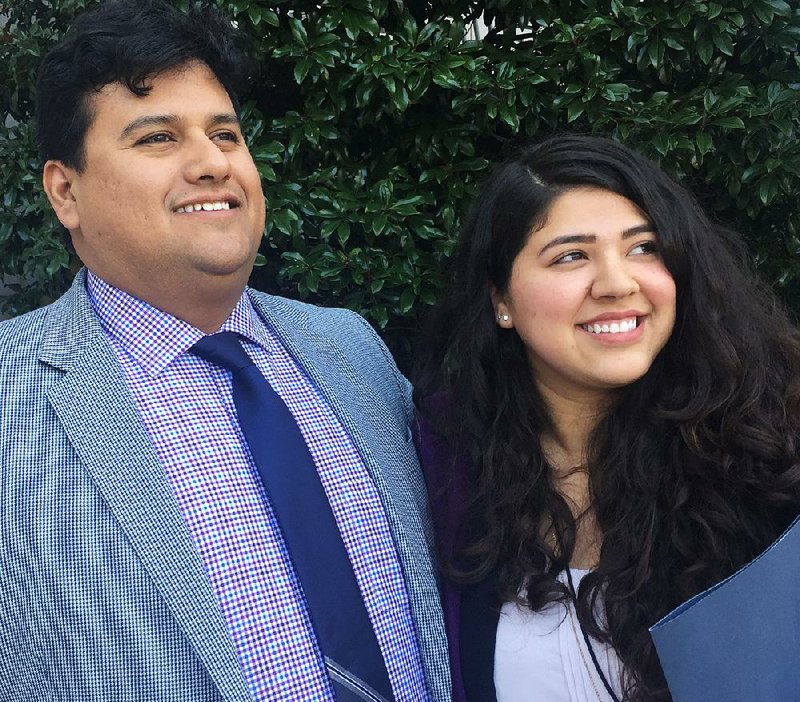Juan Mendez and his wife, Rocio Aguayo, will enjoy Thanksgiving dinner twice today in Springdale: once with his side of the family and once with hers.
"I think I'm doing the turkey, and I think I'm doing it deep fry. I'm not sure how much time I'll have to watch football," Mendez, 28, said earlier this week.
And while he's immersing the main course in the boiling peanut oil, he'll have plenty to be grateful for, he said.
"I think I'll be thankful for my wife, for our life in this country, for having my family, my parents, her parents, and I'll be thankful for the opportunity to see another day," he said.
[U.S. immigration: Data visualization of selected immigration statistics, U.S. border map]
Thanksgiving Day isn't a holiday in the country where Mendez was born. His family adopted the holiday -- with gusto -- after migrating from Chihuahua, Mexico, to Arkansas in 1997.
The family members came legally, on tourist visas, he said. But they remained in Northwest Arkansas after the visas expired, eager to embrace the American way of life, albeit without the necessary documents.
Although he hasn't stepped foot in Mexico since he was 7 years old, Mendez lives with the possibility of deportation. Eventually, he knows, he may be banished, forced out; evicted.
That fear is also familiar to Aguayo. Her mother brought her across the border, in search of a better life, more than two decades ago.
She was 7 years old.
"I remember very clearly seeing the starry sky and the shooting stars in the middle of the desert and trying to stay quiet," Aguayo, 27, said.
Like her husband, she grew up in Northwest Arkansas, graduated from Springdale High School and enrolled at the University of Arkansas, Fayetteville.
Her family, which is from Guadalajara, Mexico, quickly embraced Thanksgiving, she said.
"It's definitely an American holiday," she said. "We always made it a custom to celebrate it."
Today, while her husband is outside frying a turkey, she'll stick closer to the kitchen.
"I tend to do a green bean casserole, a corn casserole, mainly the side dishes. Things that I can just pop in the oven," she said.
Mendez and Aguayo realize that this Thanksgiving -- or one soon after -- could be their last on American soil.
President Donald Trump is ending the 5-year-old program -- Deferred Action for Childhood Arrivals -- that has allowed the couple to live and work in the U.S. without fear of sudden deportation.
Trump delayed the DACA shutdown for six months so that Congress could pass legislation addressing the status of people like Mendez and Aguayo. But thus far, there's been little action on Capitol Hill.
The Federation for American Immigration Reform, which calls for "lower levels of overall immigration," praised the Trump administration for derailing DACA, calling the program an "unconstitutional abuse of executive authority."
The Trump plan gives "DACA recipients time to get their affairs in order, but also gives Congress a unique opportunity to re-engage in the immigration debate," the organization's president, Dan Stein, said in a written statement.
Others, who call the young foreigners "Dreamers," say time is running out.
Hundreds of business leaders, including Wal-Mart CEO Doug McMillon, are urging Congress to give DACA recipients "the permanent legislative solution they deserve." In a September letter, they warned of "devastating consequences" for the U.S. economy if lawmakers fail to act.
Last month, dozens of prominent evangelical leaders, including Cross Church Northwest Arkansas pastor Ronnie Floyd, urged Congress to "pass a legislation solution for Dreamers," arguing that "the time for doing nothing is long expired."
Dreamers, they wrote, are "a special category of immigrants who are not legally culpable, who in most cases have no home other than the United States, and who are a blessing to their communities and to their churches."
"We believe Dreamers deserve to be recognized as our fellow Americans," they declared.
Mendez and Aguayo are also calling on Congress to take action.
Last week, the couple flew to Washington, D.C., stopping by the offices of all four House members from Arkansas.
They met three of the lawmakers. They also shared stories about how DACA -- created by former President Barack Obama -- had affected their lives.
"DACA in 2012 really enabled me to accomplish many of those things that I always aspired to achieve: Being able to get a driver's license; being able to get a job; being able to buy a car for myself," Mendez said. "In 2013, I bought land for myself and I built a house, we got married, we were able to actually live our own American dream."
Just under 900 square feet, their home is mortgage free, Mendez said.
"We completed it on Thanksgiving Day of last year," Mendez said.
Aguayo, who graduated from the University of Arkansas with a degree in finance and accounting, is now a senior accountant with Tyson Foods.
Mendez, who works for Wal-Mart, is taking a while longer to earn his degree.
"It's a work in progress," he said.
Nearly 800,000 people have successfully applied for DACA status since 2012; every two years, they've been able to renew their deferrals.
The program, Mendez said, has given each of them hope and opportunity.
"I think a lot of times, people take for granted how much a Social Security number means. And a work permit. But if you think about how much we've been able to accomplish in such a short time with something temporary, you can only imagine what Dreamers can accomplish with something permanent," he said.
Aguayo said she'd like to go to Mexico some day -- just to visit -- but only if she's allowed to return to Northwest Arkansas once she's done.
After two decades in the United States, she said, "This is my home."
A Section on 11/23/2017
